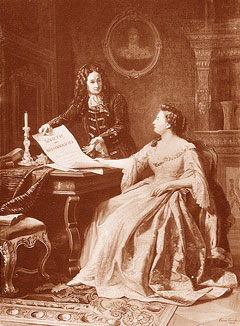
|
|
Home
Beginning Modern
Logic: Leibniz
|
Gottfried Wilhelm von Leibniz.
Born: 1 July 1646 in Leipzig.
Died: 14 Nov 1716 in Hannover.
German philosopher, mathematician, historian, and jurist,
contemporary of Newton (1642-1727). Leibniz' most important scientific discovery is
the differential and integral calculus.
|
|

|
Gottfried Wilhelm Leibniz was the last schoolman and the first modern logician.
He invented different types of formalization of Aristotelian logic which in parts anticipated George Boole's calculus.
Most of Leibniz' papers had not been published until about 1900,
thus he has exerted only little influence on the development of modern logic.
The papers in this section deal with his calculus of characteristic numbers which he invented in April 1679.
It is a complete arithmetization of Aristotelian logic in its intensional interpretation.
The characteristic numbers have been used by Lukasiewicz in his formalisation of Aristotelian logic
and may have been a source of inspiration for Gödel in his famous arithmization of predicate logic.
|

|
- [PDF]An Intensional Leibniz Semantics for Aristotelian Logic
(The Review of Symbolic Logic, Published online by Cambridge University Press 17 Mar 2010 doi:10.1017/S1755020309990396)
Since Frege’s predicate logical transcription of Aristotelian categorical logic, the standard
semantics of Aristotelian logic considers terms as standing for sets of individuals. From a
philosophical standpoint, this extensional model poses problems: There exist serious doubts that
Aristotle’s terms were meant to refer always to sets, that is, entities composed of individuals. Classical
philosophy up to Leibniz and Kant had a different view on this question—they looked at terms
as standing for concepts (“Begriffe”). In 1972, Corcoran presented a formal system for Aristotelian
logic containing a calculus of natural deduction, while, with respect to semantics, he still made
use of an extensional interpretation. In this paper we deal with a simple intensional semantics for
Corcoran’s syntax—intensional in the sense that no individuals are needed for the construction of a
complete Tarski model of Aristotelian syntax. Instead, we view concepts as containing or excluding
other, “higher” concepts—corresponding to the idea which Leibniz used in the construction of his
characteristic numbers. Thus, this paper is an addendum to Corcoran’s work, furnishing his formal
syntax with an adequate semantics which is free from presuppositions which have entered into
modern interpretations of Aristotle’s theory via predicate logic.
-
On Leibniz' characteristic numbers
Studia Leibnitiana Band 43/2002, Seite 161
147 k [PDF] Opens new window
-
G. W. Leibniz - die Utopie der Denkmaschine
228 k [PDF](in German) Opens new window
-
On Negation in Leibniz' System of Charachteristic numbers
221 k [PDF]. Opens new window
In the spring of 1679, Leibniz invented a famous interpretation of
Aristotelian logic by means of his characteristic numbers.
Leibniz was able to show that, within his model, all classical
laws of "positive" Aristotelian logic (a term logic without
negation) hold, if one uses a certain proper arithmetical
interpretation of the Aristotelian quantors A, E, I, and
O. While this construction of characteristic numbers is a highly
esteemed result today, Leibniz himself was apparently not content with
his achievement. His last notes on this subject show how hard he
struggled with different unsuccessful attempts of allowing also
for term negation within his formalism. Later on he never resumed
his work on characteristic numbers.
By proving a negative result on characteristic numbers we show in this paper why Leibniz
was bound to fail, and we also demonstrate how to enlarge his system in order to include term negation in a formal correct way.
|
|


